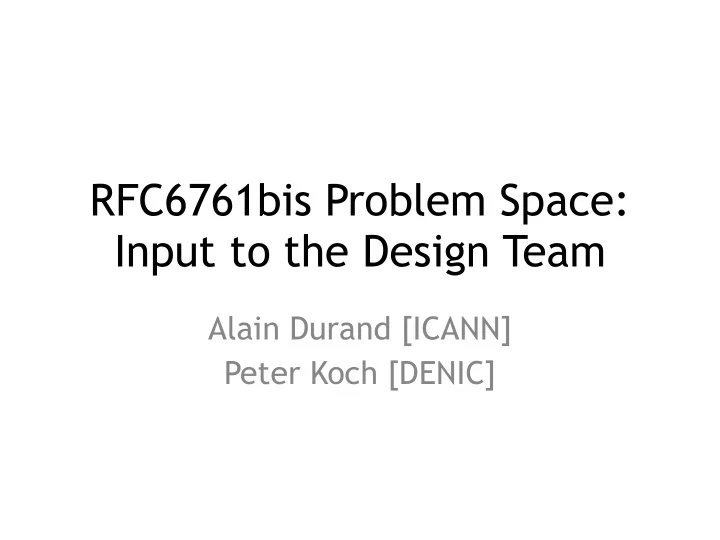

RFC6761bis Problem Space: Input to the Design Team Alain Durand [ICANN] Peter Koch [DENIC]
Not Specific Enough Guidelines to Evaluate the Proposals • RFC6761 “Seven Questions” cannot serve as a justification for the reservation, they can only give guidance to the various audiences on how to use it once it is reserved. Today evaluation is a mix of: – “Squatters right” & “Beauty contest” • Can we have “objective criteria”? – Is existing traffic toward “unreserved/ unregistered” names a valid criterion? • Can we have a process that encourage applicants to “do the right thing?” 2
Btw, What is the Process? • Standards Track vs IESG action? – cf. RFC 5226 explanations • Who should do the evaluation? – IESG?, DNSOP wg?, Ad-hoc wg? • DNSOP charter: – does not say clearly that DNSOP MUST do the evaluation: • “6. Publish documents that attempt to better define the overlapping area among the public DNS root, DNS- like names as used in local or restricted naming scopes, and the 'special names' registry that IETF manages, perhaps including how they might interact. This work must take into consideration issues that are strictly beyond the operation of the DNS itself, and the working group will consult with IETF liaisons to other organizations as appropriate.” 3
Unclear Expectations from Reserving a String • By itself, IETF action to reserve a string does not guarantee that queries will not go out on the Internet. • Is it reasonable to expect the seven audiences listed in RFC6761 to implement the recommendations? – If “yes”, in what timeframe? – IANA “special name” registry does not list the seven actions. • Do we need removal procedures for entries in the “special names” registry? 4
Name Space != DNS • .LOCAL protocol switch to mdns/port 5353 • .ONION ? • More? – Series of one-off or do we need a generic mechanism? • Is the name space unique (as opposed to the DNS name space being unique?) • RFC2826: – To remain a global network, the Internet requires the existence of a globally unique public name space . The DNS name space is a hierarchical name space derived from a single, globally unique root. 5
Need for IETF/ICANN Coordination • RFC6761: – Hence, the act of defining such a special name creates a higher-level protocol rule, above ICANN’s management of allocable names on the public Internet. • Single root for the namespace: � Negative/Positive entries need to be coordinated • Lightweight coordination model? – In most case, a non-issue, just register the string – May be conflicts with “hot” issue • RFC6761 says that any name can be reserved, not just TLDs – Is that a reasonable thing to expect? – Requires coordination with TLDs, SLDs, …, thus beyond or besides ICANN 6
Separating Protocol and Policy • Is there a need for “a” string vs a need for “that” string? • Can the IETF really do more than the protocol analysis part? • Next question: “which” string? – Should the string selection be the result of the coordination activities? 7
Recommend
More recommend